Happy New Year from Pioneer Institute
/0 Comments/in Featured /by Editorial Staff Share on Facebook
Share on Twitter
Share on
LinkedIn
+
We hope you are taking time to celebrate and find peace during this season. Thank you for your support for Pioneer, which has helped us stay focused on steering the state’s debate on the pandemic response, and making progress on our key policy objectives. Here’s to a great 2021 for Massachusetts and the country.
Recent Posts
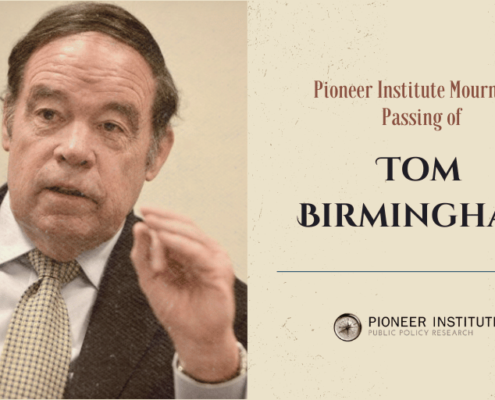
Pioneer Institute Mourns the Passing of Tom Birmingham
We at Pioneer Institute mourn the loss of Tom Birmingham even as we are thankful for having had the opportunity to get to know this kind and brilliant man when in office and later, when he spent several years as Pioneer’s distinguished senior fellow in education.

Pulitzer Winner Prof. David Garrow on the Rev. Dr. Martin Luther King, Jr. and the Civil Rights Movement
https://chrt.fm/track/4655F8/api.spreaker.com/download/episode/53284998/tlc_davidgarrow.mp3
This…
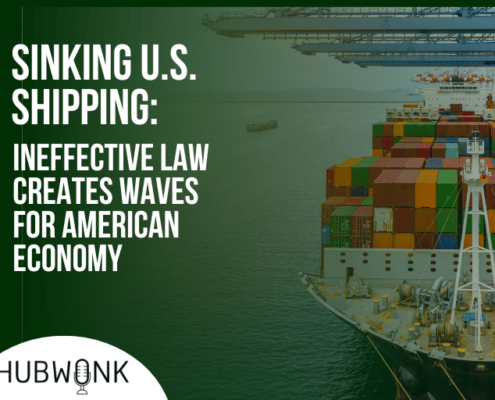
Sinking U.S. Shipping: Ineffective Law Creates Waves for American Economy
Host Joe Selvaggi talks with Cato Institute research fellow Colin Grabow about the failure of the Jones Act, a law that sought to protect the U.S. shipbuilding and merchant marine capacity. They examine its downstream effects on inflation, supply chain fragility, and energy access that directly affect every American.
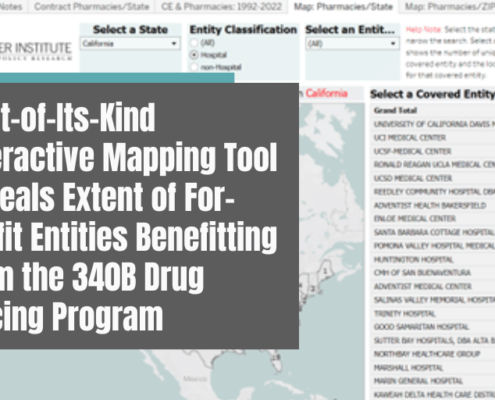
First-of-Its-Kind Interactive Mapping Tool Reveals Extent of For-Profit Entities Benefitting from the 340B Drug Pricing Program
Today, Pioneer Institute released a first-of-its-kind, 50-state mapping tool and database highlighting the troubling way in which hospitals and covered entities leverage unlimited pharmacy contracts under the 340B Drug Pricing Program.

Independent Institute’s Dr. Richard Vedder on Higher Education, Skyrocketing Tuitions, & the Student Debt Crisis
This week on “The Learning Curve," co-hosts Cara Candal and Gerard Robinson talk with Dr. Richard Vedder, Senior Fellow at the Independent Institute and Distinguished Emeritus Professor of Economics at Ohio University. He shares analysis on the macro impact of COVID on the U.S. labor market, and the long-term economic prospects of American college students. He reviews insights from his recent book, "Restoring the Promise: Higher Education in America."

Shopping Hospital Value: Price Transparency Mandate Brings Market Forces to Medicine
Hubwonk host Joe Selvaggi talks with Pioneer Institute's senior healthcare fellow Barbara Anthony about her recently released paper, Massachusetts Hospitals: Uneven Compliance with New Federal Price Transparency Law, and how price transparency can empower consumers to shop for better value and encourage hospitals to offer more competitive costs.

Columbia’s Prof. Roosevelt Montás on the Great Books & a Liberal Arts Education
Professor Roosevelt Montás, Director of the Freedom and Citizenship Program at Columbia University, and author of Rescuing Socrates: How the Great Books Changed My Life and Why They Matter for a New Generation, shares his immigrant story and what inspired his appreciation for the Great Books tradition.

Immigration Unbound: After Title 42 Comes the Deluge
Hubwonk host Joe Selvaggi talks with Todd Bensman, senior fellow at the Center For Immigration Studies, about the conditions for aspiring immigrants and border security officials at the U.S.-Mexico border and the likely effects of the expiration of Title 42, a policy that had denied asylum claims during Covid-19.
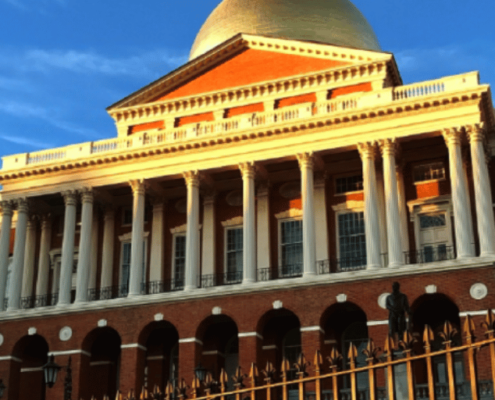
Pioneer Commends MA Governor-elect Healey’s Step Toward Greater Transparency
Pioneer Institute commends Governor-elect Maura Healey for choosing not to claim a public records exemption for the governor’s office. Governor-elect Healey also pledged to support legislation that would curb exemptions claimed by the legislative and judiciary branches of state government.

UK’s Prof. Michael Slater on Charles Dickens, Ebenezer Scrooge, and A Christmas Carol
This week on “The Learning Curve," co-host Gerard Robinson and guest co-host Mary Connaughton talk with Prof. Michael Slater, Emeritus Professor of Victorian Literature at Birkbeck College, University of London, and the world's foremost expert on Charles Dickens and his works. They discuss some of the main elements of Dickens’ brilliant, prolific, and complicated life, as the 19th century’s most influential, best-selling writer of memorable works, from Oliver Twist to Great Expectations.

Eight Billion Minds: Unsustainable Population Bomb or Infinite Resource?
Hubwonk host Joe Selvaggi talks with Cato Scholar and author Marian Tupy about his new book, Superabundance: The Story of Population Growth, Innovation, and Human Flourishing on an Infinitely Bountiful Planet, focusing on the contrast in policy perspectives between those who see humans consumers of finite resources and those who recognize the unlimited potential of human ingenuity.

Study Urges Massachusetts to Embrace Innovative School Models
A new policy brief from Pioneer Institute urges Massachusetts policymakers to encourage the proliferation and progress of non-traditional models that offer families creative, flexible, personalized and low-cost private education options.

Senegal’s Magatte Wade on Education & Economic Freedom in Africa
This week on “The Learning Curve," Cara and Gerard talk with Magatte Wade, the founder & CEO of Skin Is Skin and an advocate for African dignity and prosperity. Her forthcoming book is "The Heart of the Cheetah."

MBTA Safety Overhaul: Retooling Teams For Trustworthy Transit
This week on Hubwonk, host Joe Selvaggi talks with transit advocate and expert Chris Dempsey about ways in which structural change in the MBTA's safety oversight can be reformed to improve performance, engender greater trust amongst the region’s riders, and reduce transportation congestion in our growing economy.
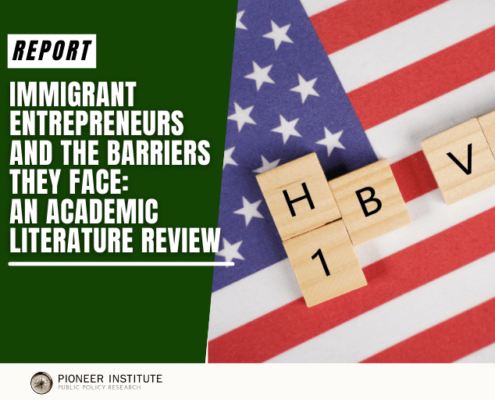
Report: Immigrant Entrepreneurs Provide Economic Benefits, but Face Significant Obstacles
Immigrants have started a quarter of all businesses in Massachusetts despite making up just 17 percent of the state workforce, and those establishments appear to be more innovative than those founded by native-born Americans. Despite these contributions, shrinking federal visa caps and red tape are among the factors making it more difficult for immigrants to come to the U.S., according to “Immigrant Entrepreneurs and the Barriers They Face: An Academic Literature Review,” published by Pioneer Institute.

Former U.S. Secretary of Education Betsy DeVos on Edu Federalism & School Choice
This week on “The Learning Curve," guest co-hosts Denisha Allen and Kerry McDonald talk with Betsy DeVos, a former United States Secretary of Education and the author of the book, Hostages No More: The Fight for Education Freedom and the Future of the American Child. She shares how she became one of the country’s foremost proponents of school choice, educational federalism, and bold changes to K-12 education.

Poll Finds Strong Majority of Massachusetts Residents Support Restoring U.S. History MCAS Graduation Requirement
Sixty-two percent of Massachusetts residents support restoring passage of a U.S. history test as a public high school graduation requirement, according to a poll of Massachusetts residents’ attitudes toward education policy commissioned by Pioneer Institute and conducted by the Emerson College Polling Center.

Climate Death Toll: Will A Warming World Overwhelm Human Resiliency?
This week on Hubwonk, host Joe Selvaggi talks with climate scientist and Johns Hopkins lecturer Dr. Patrick Brown about his recent paper, Human Deaths from Hot and Cold Temperatures and Implications for Climate Change, on the factors that contribute to high climate-related mortality, and those that lead to better resiliency.



